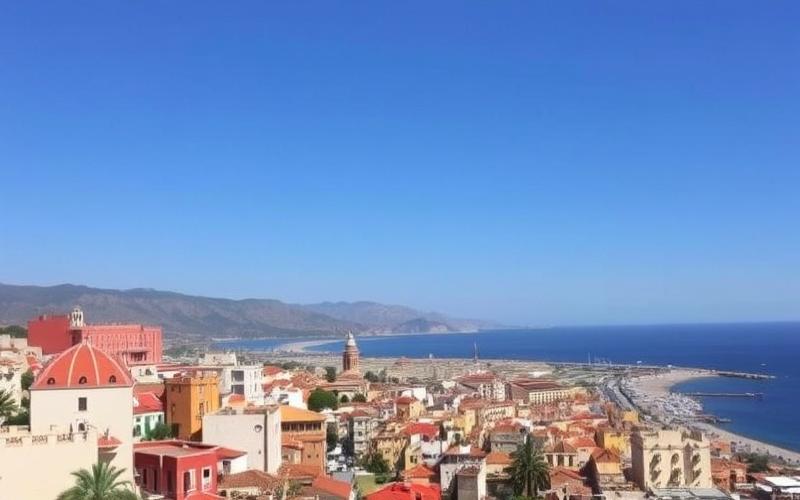
 Published on and written by Cyril Jarnias
Published on and written by Cyril Jarnias
Spain, with its sunny climate and relaxed lifestyle, attracts many foreign investors eager to purchase property. However, the real estate buying process in this country can prove complex and fraught with pitfalls for the uninitiated. In this article, we will explore the most common mistakes made by foreign buyers and give you the keys to avoid them. Whether you’re considering buying a villa on the Costa del Sol, an apartment in Barcelona, or a country house in Andalusia, these tips will help you secure your investment and realize your Spanish dream with complete peace of mind.
1. Neglecting Legal Checks: The Trap of Carelessness
One of the most frequent and potentially costly mistakes when buying real estate in Spain is underestimating the importance of legal checks. Unlike France, where the notary plays a central role in securing the transaction, in Spain, this responsibility falls primarily on the buyer.
Many buyers, carried away by the excitement of their project, neglect to thoroughly check the legal status of the desired property. This negligence can have disastrous consequences, ranging from the discovery of hidden debts to purchasing an illegally built property.
To avoid this trap, it is crucial to hire a lawyer specialized in Spanish real estate law. This professional can perform all necessary checks, including:
- Examining the “Nota Simple,” an official document detailing the property’s history and legal status
- Verifying with the Property Registry to ensure there are no mortgages or encumbrances
- Checking the property’s urban planning compliance
- Verifying any potential debts related to the property (taxes, community fees, etc.)
By investing in these preliminary checks, you protect yourself against many risks and ensure the peace of mind needed to fully enjoy your acquisition.
Good to Know:
In Spain, the notary does not perform an in-depth legal check as in France. It is therefore essential to work with a specialized lawyer to secure your purchase.
2. Ignoring Urban Planning Specifics: The Nightmare of Illegal Construction
Another major mistake is neglecting the urban planning aspects specific to Spain. The country has experienced periods of intensive construction in the past, sometimes disregarding current regulations. The result: many properties, especially in coastal or rural areas, may have been built without the necessary permits.
Buying a property that does not comply with urban planning rules can lead to serious consequences:
- Risk of partial or total demolition of the property
- Inability to obtain certain services (water, electricity connection)
- Substantial fines imposed by local authorities
- Difficulties selling the property in the future
To avoid this catastrophic scenario, it is essential to:
- Verify the existence of a valid building permit (Licencia de Obra)
- Ensure the property has a certificate of completion (Certificado Final de Obra)
- Check that all extensions or modifications have been properly declared and authorized
- Consult the local urban plan to learn about any restrictions on the property
In some cases, it may be possible to regularize a non-compliant situation, but this usually involves lengthy and costly procedures. It is therefore preferable to ensure the property’s compliance before purchase.
Good to Know:
Some Spanish regions, like Andalusia, have implemented regularization procedures for older non-compliant constructions. Check with local authorities if you encounter this situation.
3. Underestimating Additional Costs: The Growing Bill
Many foreign buyers focus solely on the purchase price of the property, without considering all the additional fees that can significantly increase the final bill. This mistake can quickly turn a good deal into a financial nightmare.
In Spain, the fees associated with buying real estate are generally higher than in France and can represent between 10% and 15% of the purchase price. These costs notably include:
- Property Transfer Tax (ITP) for used properties, ranging from 6% to 10% depending on the region
- VAT (IVA) of 10% for new properties
- Notary fees, approximately 1% to 2% of the purchase price
- Property Registry registration fees, approximately 0.5% of the purchase price
- Lawyer fees, generally between 1% and 2% of the purchase price
- Real estate agency fees, if you use an intermediary
In addition to these initial fees, there are recurring costs not to be overlooked:
- Property Tax (IBI), equivalent to the property tax
- Community fees for apartments
- Home insurance
- Potential management fees if the property is intended for rental
To avoid unpleasant surprises, it is essential to establish a detailed budget including all these costs before committing. Do not hesitate to consult a tax expert or lawyer to get an accurate estimate of the expected fees.
Good to Know:
Some Spanish regions offer tax benefits for real estate purchases, especially for first-time buyers or large families. Inquire about possible tax reductions you might be eligible for.
4. Neglecting the Importance of the NIE: The Forgotten Administrative Key
A common mistake among foreign buyers is underestimating the importance of the NIE (Número de Identidad de Extranjero) and not anticipating its acquisition. This identification number for foreigners is essential for any real estate transaction in Spain, as well as for many administrative procedures like opening a bank account or subscribing to water and electricity contracts.
Obtaining a NIE can take several weeks, or even months in some cases. Not having it at the right time can significantly slow down, or even compromise, your purchase project. Here are the steps to follow to obtain your NIE:
- Prepare the necessary documents: passport, proof of address, completed EX-15 form, and justification for the request (in this case, real estate purchase)
- Make an appointment with the foreigner’s office (Oficina de Extranjería) in the province where you wish to buy
- Attend the appointment in person with all required documents
- Pay the associated administrative fees
It is possible to request the NIE from your home country through the Spanish consulate, but the process may take longer. Some lawyers or managers (gestores) can assist you with this process for an additional fee.
Good to Know:
The NIE is valid for life, but the certificate issued to you has a limited validity (generally 3 months). Make sure you have a valid certificate at the time of signing the purchase deed.
5. Rushing into the First Property: The Impulse Buy Mistake
The excitement of finding a property in Spain can sometimes lead buyers to rush into the first property that seems to meet their expectations. This haste can lead to regrettable and costly long-term decisions.
The Spanish real estate market is vast and varied, with significant differences in price and quality depending on the regions and even neighborhoods. Rushing into a purchase without exploring all available options can make you miss better opportunities or lead you to overpay for your property.
To avoid this mistake, here are some tips:
- Take the time to clearly define your search criteria: type of property, location, budget, etc.
- Explore different regions and compare prices per square meter
- Visit several properties matching your criteria, even if the first one seems perfect
- Don’t hesitate to revisit a property you’re interested in at different times of the day to assess the environment (noise, lighting, etc.)
- Inquire about upcoming urban planning projects in the neighborhood that could impact the property’s value
- Consult local real estate market statistics to ensure the asking price aligns with market trends
Taking the time to compare and think carefully will allow you to make an informed choice and find the property that truly meets your expectations and budget.
Good to Know:
Real estate prices in Spain can vary considerably from one region to another. In 2025, cities like Málaga or Alicante still offer good investment potential with expected price increases, while major metropolises like Madrid or Barcelona show much higher prices per square meter.
6. Ignoring Tax Specifics: The Double Taxation Trap
A common mistake among foreign buyers is neglecting the tax implications of their real estate acquisition in Spain. This negligence can lead to unpleasant surprises, particularly in terms of double taxation.
As a non-resident property owner in Spain, you will be subject to several tax obligations:
- Non-Resident Income Tax (IRNR): even if you don’t rent out your property, you must declare a fictitious income based on the property’s cadastral value
- Wealth Tax (Impuesto sobre el Patrimonio): applicable if the value of your assets in Spain exceeds a certain threshold
- Inheritance and Gift Tax (Impuesto sobre Sucesiones y Donaciones): in case of property transfer
Furthermore, depending on your country of residence, you could be subject to double taxation on this income or on the capital gains in case of resale. It is therefore crucial to:
- Consult a tax expert familiar with tax treaties between your country of residence and Spain
- Understand your reporting obligations in both countries
- Consider legal tax optimization strategies, such as creating a holding company in some cases
- Anticipate the tax implications of a potential property resale
Adequate tax planning can save you considerable amounts and avoid administrative complications.
Good to Know:
Spain has signed tax treaties with many countries to avoid double taxation. However, the application modalities can be complex. Don’t hesitate to consult a tax advisor specialized in international transactions.
7. Underestimating Cultural and Legal Differences: The System Shock
The last, but not least, mistake is underestimating the cultural and legal differences between your home country and Spain. These differences can affect not only the purchasing process but also your long-term experience as a property owner.
Here are some key points to keep in mind:
- The Spanish notarial system differs from the French system: the Spanish notary has a more limited role and does not perform the same checks as in France
- Contracts and documents are generally drafted in Spanish: make sure you understand all terms before signing anything
- Administrative deadlines and procedures may be longer than expected: be patient
- Community and neighborhood rules may differ from those in your home country
- Construction standards and quality standards may vary: what is considered normal in Spain may surprise you
To navigate this new environment effectively, it is recommended to:
- Work with local professionals experienced in transactions with foreigners
- Don’t hesitate to ask questions and request clarifications on aspects that seem unclear
- Take the time to familiarize yourself with local customs and practices
- Learn the basics of Spanish or the local language to facilitate your interactions
By taking these cultural and legal differences into account, you will be better prepared to face the challenges of buying real estate in Spain and fully enjoy your new property.
Good to Know:
Some Spanish regions, like Catalonia or the Basque Country, have their own languages and traditions. Familiarize yourself with local specifics for better integration.
In conclusion, buying real estate in Spain can be a rewarding experience and an excellent investment, provided you are well prepared. By avoiding these common mistakes and surrounding yourself with the right professionals, you will maximize your chances of a successful transaction and fully enjoy your Spanish property.
Remember that each situation is unique and rules can change. It is always recommended to consult local experts to get the most up-to-date advice best suited to your personal situation.
Good to Know:
The Spanish real estate market continues to offer interesting opportunities in 2025, with still attractive prices in some regions and growth potential, especially in coastal areas and major cities. However, thorough due diligence remains essential to secure your investment.
Disclaimer: The information provided on this website is for informational purposes only and does not constitute financial, legal, or professional advice. We encourage you to consult qualified experts before making any investment, real estate, or expatriation decisions. Although we strive to maintain up-to-date and accurate information, we do not guarantee the completeness, accuracy, or timeliness of the proposed content. As investment and expatriation involve risks, we disclaim any liability for potential losses or damages arising from the use of this site. Your use of this site confirms your acceptance of these terms and your understanding of the associated risks.

















